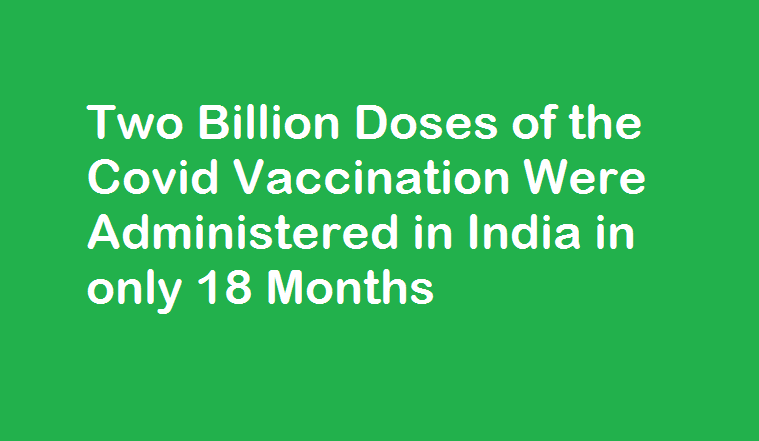India has achieved a major milestone in the fight against Covid-19 by administering 2 billion vaccine doses. The country has been vaccinating its population rapidly, with an average of about 10 million doses administered daily. This achievement is significant for India and the world, as it accounts for more than 20% of all vaccines administered globally.
The government’s efforts to ramp up vaccination have been commendable, with special emphasis on reaching remote and rural areas. Several private companies and NGOs have also played an active role in facilitating vaccination drives across the country.
However, despite this impressive feat, India still faces challenges such as vaccine hesitancy and concerns over the efficacy of certain vaccines. The government must continue to address these issues and work towards ensuring that every eligible individual is vaccinated promptly. Overall, India’s vaccination milestone is a step towards overcoming the pandemic and restoring normalcy.
Rapid rollout: How India administered 2 billion doses in 18 months
One of the key drivers behind India’s rapid rollout of vaccinations was the government’s decision to involve private healthcare providers and local communities in the distribution process. This helped to speed up the vaccination process by allowing for a more decentralized approach, with vaccines being administered in local clinics and hospitals rather than just central facilities.
The Indian government also invested heavily in vaccine production, with several domestic manufacturers scaling up their operations to meet the demand. This enabled India to not only vaccinate its population but also export doses to other countries worldwide.
Other factors that contributed to India’s successful rollout included a strong public health infrastructure, effective communication campaigns that addressed vaccine hesitancy, and a willingness among citizens to get vaccinated. Overall, India’s experience shows that with proper planning and execution, it is possible for countries worldwide to achieve high levels of vaccination coverage in a short time.
Success factors: Government initiatives and public participation
One of the key success factors behind India’s rapid administration of two billion COVID-19 vaccine doses is the government’s proactive initiatives. The Indian government implemented measures to increase vaccine production, including granting emergency use authorization to various manufacturers and providing financial support for vaccine research and development. This led to a significant increase in the domestic supply chain, allowing for higher volumes of vaccines to be produced and distributed.
Another important factor behind India’s successful vaccination campaign was public participation. Despite initial hesitancy about receiving the vaccine due to misinformation and rumors surrounding its safety, Indians eventually came around thanks to robust awareness campaigns by the government and non-governmental organizations. In addition, community mobilization efforts played a critical role in getting people vaccinated quickly, particularly in rural areas where access to healthcare can be limited. These efforts included setting up vaccination centers at churches, schools, and other community centers so people could get their shots close to home. Strong government initiatives and active public participation were instrumental in driving India’s successful COVID-19 vaccination campaign.
Impact on pandemic: Reduction in cases, deaths, and economic recovery
The impact of the Covid-19 pandemic has been devastating across the globe. However, with the rollout of vaccinations in many countries, there is hope for reducing cases and deaths. India’s vaccination drive has been one of the largest in the world, with over 2 billion doses administered within just 18 months. This has resulted in a significant drop in covid cases and fatalities across the country.
With fewer cases, businesses can begin reopening, and economic recovery can occur. People previously out of work can now return to their jobs with confidence that they are protected against Covid-19. The reopening of businesses also means that people can resume their normal lives, including participating in social activities without fear of contracting or spreading Covid-19.
Overall, India’s successful vaccination drive is an excellent example of how prioritizing public health measures such as vaccinations can positively reduce Covid-19 cases and deaths while promoting economic recovery. It highlights the importance of government support for vaccination programs to ensure everyone receives protection against this deadly virus.
rajkotupdates.news:covid-vaccine-record-india-2-billion-doses-of-covid-vaccine-in-just-18-months
Plans: Continued vaccination efforts and booster shots
They aim to achieve universal vaccination coverage by December 2021 and have already announced plans for a third dose or booster shot for those who received their second dose at least six months prior. The hope is that this will provide additional protection against new variants and any potential waning immunity.
However, there are also concerns about vaccine equity as many low-income countries struggle with vaccine access. The World Health Organization has called for wealthier nations to prioritize sharing doses with these countries rather than offering booster shots to their citizens. Ultimately, the success of future vaccination efforts will depend on global cooperation and equitable distribution of resources.
Read Also: rajkotupdates.news:indias-first-5g-call-by-ashwini-vaishnav

